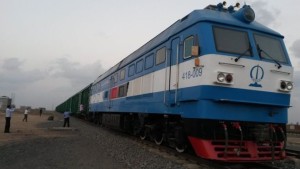“We decided to open the railway early because of the drought, the worst in decades,” says Getachew Betru, chief executive of the Ethiopian Railways Corporation (ERC).
It is a Saturday, but this thoughtful, intelligent man is busy working. Except for the guards at the gate, nobody else is at the office.
 Across the road, a white and green train whisks up to a station platform. It is part of Addis Ababa’s newly opened light rail (or tram) system, the first in sub-Saharan Africa.
Across the road, a white and green train whisks up to a station platform. It is part of Addis Ababa’s newly opened light rail (or tram) system, the first in sub-Saharan Africa.
Mr Getachew shows me diagrams of a vast planned railway network, snaking its way across landlocked Ethiopia, linking Africa’s second most populous country to Djibouti, Sudan, South Sudan and Kenya.
The railway is his baby. Like many Ethiopians, he left the country during the harsh years of dictatorship, but returned with a doctorate in engineering and a vision.
It all started when he took a trip with his family.
“We were driving through the countryside when we came across a railway track. Like so many boys, my sons loved trains and insisted we wait for one. It never came. I asked somebody when it might arrive. He told me it had been 10 years since the last train. I decided to try to do something about it. Now they call me Ethiopia’s Brunel, after the famous British civil engineer.”
Pan-African dream
The dream is that one day, the railway will extend from the Red Sea in Djibouti all the way across Africa to the Atlantic Ocean. A few wars will have to end first.
Due to the urgent need to feed the 8.2 million people Ethiopia says are suffering from the drought, the Addis Ababa-Djibouti line opened ahead of schedule on 20 November.
The first train to travel along the nearly 800km track delivered more than 3,000 tonnes of grain from Djibouti port to drought-affected areas. The United Nations says more than 15 million people will be in need of emergency food aid by the beginning of 2016.
The ERC says the railway will completely transform the way humanitarian assistance is delivered, in a country regularly affected by drought. “The trains will deliver bulk quantities of food aid very close to drought-affected people. It will do this in a matter of a few hours,” says ERC technical adviser, Muluken Mesfin.
Chinese track
The Chinese-built track runs parallel to the abandoned Ethio-Djibouti railway, built more than 100 years ago by France for Emperor Menelik. Costing some $3bn (£2bn), it starts at sea level in Djibouti. It then makes its way through Ethiopia’s dramatic, challenging terrain until it reaches Addis Ababa, about 2,500m above sea level.
Mr Getachew expresses bewilderment at the World Bank and Western donors such as the European Union, who, he says, were reluctant to fund the railway project. “I think the road lobby was too strong. We ended up with the Chinese, who are not only constructing the railway, but providing most of the funding too.”
Potential for peace
The economic potential of Ethiopia’s planned 5,000km rail network is obvious. But the railway might do a whole lot more, both in terms of regional integration and maybe even peacemaking.
Railways are being constructed all over Africa. The East African Railway Master Plan hopes to revive existing lines in Kenya, Uganda and Tanzania, eventually extending them to Rwanda, Burundi, South Sudan and Ethiopia.
Read more: Can Ethiopia’s railway bring peace to Somalia?
Source: BBC News


